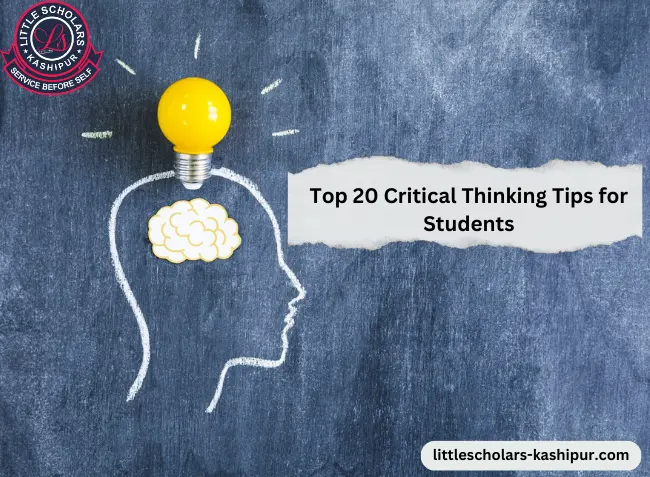What is critical thinking?
Critical thinking refers to the ability to analyze, evaluate, and interpret information or situations effectively. It involves being able to objectively assess arguments, evidence, and ideas, considering different perspectives and viewpoints before forming conclusions or making decisions. Critical thinking entails asking questions, challenging assumptions, and reasoning logically to solve problems and make informed judgments. It is an essential skill for academic success, professional growth, and everyday life, enabling individuals to think more deeply, make better decisions, and navigate complex situations with clarity and insight.
Understanding Critical Thinking Skills
Critical thinking skills encompass various cognitive processes, including analysis, interpretation, inference, explanation, evaluation, and self-regulation. These skills enable students to think critically about issues, concepts, and arguments, leading to deeper understanding and better decision-making abilities.
Top 20 Critical Thinking Tips for Students
1. Question Everything: Encourage a habit of questioning assumptions, beliefs, and information encountered. Critical thinkers ask probing questions to uncover underlying motives and biases.
2. Practice Active Listening: Actively listen to others' perspectives without judgment. Listen attentively to understand different viewpoints before forming opinions.
3. Develop Analytical Skills: Sharpen analytical abilities by breaking down complex problems into smaller components and examining their relationships.
4. Engage in Reflective Thinking: Reflect on past experiences, decisions, and outcomes to identify patterns and learn from successes and failures.
5. Seek Different Perspectives: Embrace diversity of thought by seeking out alternative viewpoints and considering different cultural, social, and ideological perspectives.
6. Avoid Jumping to Conclusions: Resist the urge to make hasty judgments based on limited information. Take the time to gather relevant data and consider multiple viewpoints before concluding.
7. Practice Socratic questioning: Employ the Socratic method to engage in constructive dialogue and challenge assumptions through thought-provoking questions.
8. Cultivate Curiosity: Foster a sense of curiosity and wonder about the world. Ask "why" and "how" questions to delve deeper into topics of interest.
9. Learn from Mistakes: View mistakes as opportunities for growth and learning. Analyze errors to understand their root causes and develop strategies for improvement.
10. Enhance Problem-Solving Abilities: Develop problem-solving skills by approaching challenges systematically, considering alternative solutions, and evaluating their effectiveness.
11. Improve Decision-Making: Make informed decisions by weighing evidence, assessing risks, and considering long-term consequences.
12. Stay Informed: Keep abreast of current events, trends, and developments across various fields to broaden your knowledge and perspective.
13. Utilize Mind Mapping Techniques: Use visual tools like mind maps to organize thoughts, brainstorm ideas, and make connections between concepts.
14. Assess Credibility of Information: Evaluate the reliability and validity of sources by examining evidence, credentials, and potential biases.
15. Develop Creative Thinking Skills: Cultivate creativity by exploring new ideas, experimenting with different approaches, and embracing uncertainty.
16. Foster Intellectual Humility: Acknowledge the limitations of your knowledge and remain open to revising your beliefs in light of new evidence or perspectives.
17. Embrace Complexity: Embrace complexity and ambiguity as inherent aspects of reality. Avoid oversimplification and seek to understand the nuances of complex issues.
18. Practice time management: allot sufficient time for critical thinking activities, prioritizing tasks based on their importance and deadlines.
19. Build Confidence in Reasoning: Develop confidence in your ability to reason logically and effectively communicate your thoughts and ideas.
20. Continuously Learn and Grow: Cultivate a growth mindset by embracing lifelong learning and actively seeking opportunities for personal and professional development.
Early Childhood Education: Establishing the Framework for Success: Read now
Benefits of Cultivating Critical Thinking Skills
Developing critical thinking skills offers numerous benefits for students, including improved academic performance, enhanced problem-solving abilities, and better decision-making skills. Moreover, critical thinking fosters intellectual curiosity, creativity, and adaptability, preparing students for success in both their academic and professional pursuits.
Challenges in Developing Critical Thinking Skills
Despite the importance of critical thinking, many students face challenges in developing these skills. Common obstacles include limited exposure to essential exercises of thinking, resistance to questioning established beliefs, and difficulty navigating the vast amount of information available.
Strategies to Overcome Challenges
To address these challenges, educators and parents can implement various strategies to promote critical thinking among students. Encouraging open-mindedness, providing real-world examples, and integrating critical thinking into the curriculum are effective approaches to foster the development of critical thinking skills.
Building a Sustainable Future: with Environmental Sustainability and Stewardship in Action: Read now
Conclusion
In conclusion, critical thinking is a vital skill that empowers students to navigate the complexities of the modern world effectively. By incorporating the top 20 critical thinking tips outlined in this article into their daily lives, students can enhance their analytical abilities, broaden their perspectives, and become more adept problem solvers. Embracing critical thinking enriches academic learning and equips students with the essential skills needed to thrive in an ever-changing global society.




